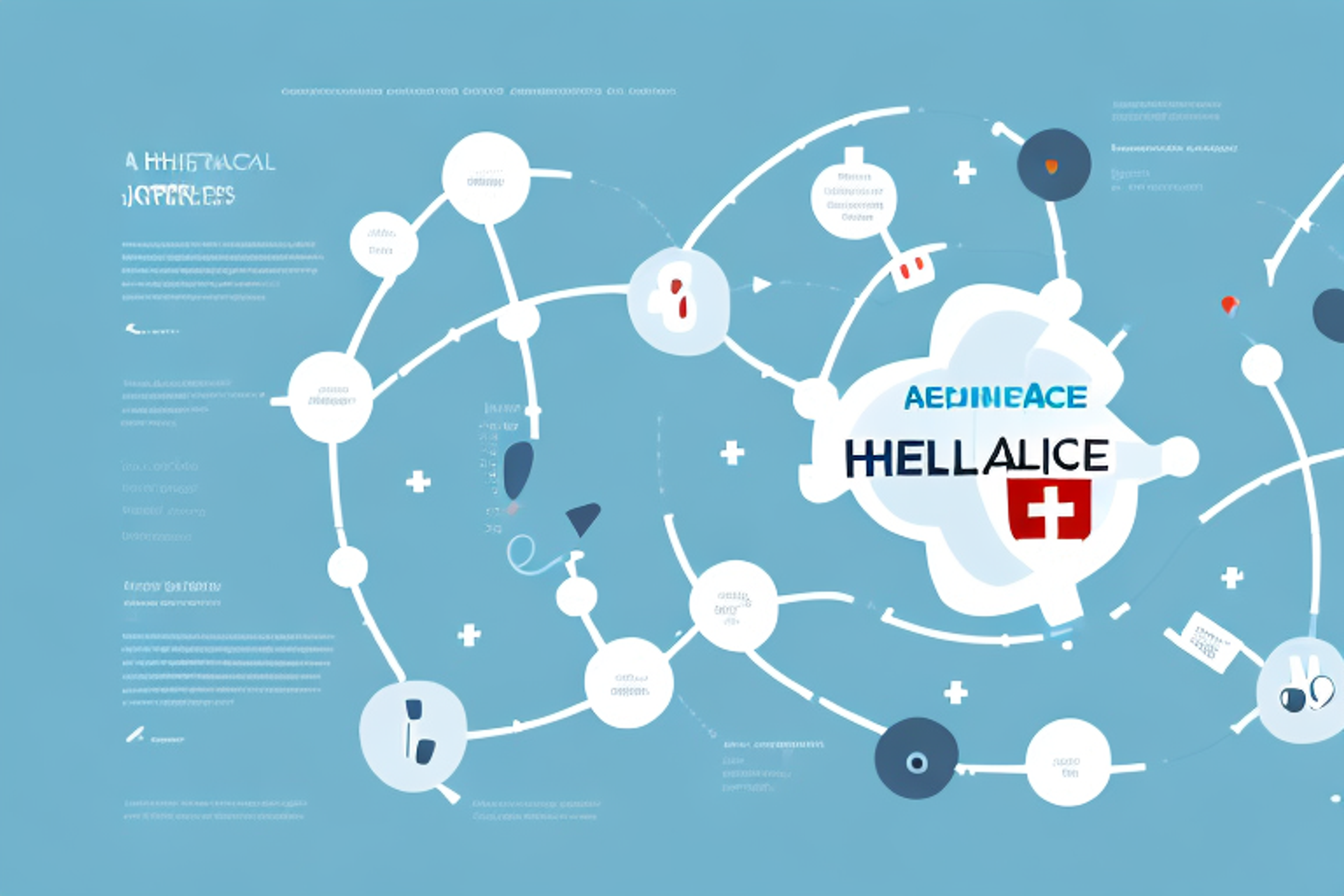The Key Factors General Catalyst Considers for Healthcare Startups
Discover the essential factors that General Catalyst, a leading venture capital firm, considers when investing in healthcare startups.
Posted March 6, 2025

Table of Contents
Starting a healthcare business is not an easy task. It requires a lot of research, planning, and understanding of the industry and market trends. General Catalyst, a venture capital firm, has a wealth of experience in healthcare startups, supporting and investing in a range of companies that offer innovative solutions to healthcare challenges. In this article, we will explore the key factors that General Catalyst considers for healthcare startups, what sets them apart, and how to navigate the path to success.
Introduction to General Catalyst and Healthcare Startups
General Catalyst is a venture capital firm that invests in early-stage startups working on innovative solutions. The firm has a long history of investing in healthcare startups and has seen success in a range of companies, from digital health platforms to medical devices. With a team of experts specialized in healthcare, General Catalyst has been able to identify opportunities and invest in startups that can transform the healthcare industry.
One of the notable healthcare startups that General Catalyst has invested in is Hometeam, a company that provides in-home care for seniors. Hometeam uses technology to match caregivers with seniors based on their needs and preferences, and provides real-time updates to family members on the care being provided. General Catalyst recognized the potential of Hometeam's innovative approach to senior care and invested in the company, which has since expanded to multiple states.
In addition to investing in healthcare startups, General Catalyst also provides resources and support to help these companies grow and succeed. The firm has a network of industry experts and advisors who can provide guidance on everything from product development to marketing strategies. General Catalyst also hosts events and workshops to connect startups with potential partners and investors, and provides access to its network of portfolio companies for collaboration and knowledge-sharing.
Understanding the Healthcare Industry Landscape
The healthcare industry is complex and constantly changing. Startups need to have an in-depth understanding of the industry landscape to be successful. General Catalyst evaluates startups that have a keen understanding of the industry, including healthcare regulations, market trends, and consumer demand. Startups that can offer innovative, long-term solutions to healthcare challenges are more likely to receive investment.
One of the biggest challenges facing the healthcare industry is the rising cost of healthcare. Startups that can offer cost-effective solutions to healthcare providers and patients are in high demand. This includes technologies that can streamline administrative tasks, reduce waste, and improve patient outcomes.
Another important factor to consider in the healthcare industry is the increasing focus on preventative care. Startups that can offer solutions to help patients stay healthy and avoid costly medical interventions are highly valued. This includes technologies that can track and monitor health metrics, provide personalized health recommendations, and promote healthy lifestyle choices.
The Importance of Market Size in Healthcare Startups
Market size is a key factor when evaluating startups. Healthcare is an industry with a massive potential market size, and General Catalyst looks for startups working on solutions in large markets that are underserved. Startups that can demonstrate both a significant market size and an innovative approach to addressing market needs are more likely to secure funding.
One of the reasons why market size is so important in healthcare startups is because it directly impacts the potential for growth and scalability. A larger market size means that there is a greater opportunity for the startup to expand and reach more customers. This can lead to increased revenue and profitability, which is attractive to investors.
However, it's important to note that market size alone is not enough to guarantee success. Startups also need to have a deep understanding of their target market and be able to effectively address their needs. This requires a combination of market research, customer feedback, and a willingness to iterate and improve upon their solutions over time.
The Role of Technology in Healthcare Startups
Technology is revolutionizing the healthcare industry, and General Catalyst is particularly interested in startups that leverage technology to create better solutions. Startups that offer digital platforms, medical devices, or healthcare analytics have a significant advantage if they can demonstrate how their technology can improve patient outcomes, reduce costs, or improve the efficiency of healthcare delivery.
One area where technology is making a significant impact is in telemedicine. With the rise of remote consultations and virtual care, patients can now receive medical attention from the comfort of their own homes. This not only improves access to healthcare for those in remote or underserved areas, but it also reduces the burden on hospitals and clinics.
Another area where technology is transforming healthcare is in the use of artificial intelligence (AI) and machine learning. These technologies can analyze vast amounts of medical data to identify patterns and make predictions, which can help doctors make more accurate diagnoses and develop more effective treatment plans. AI-powered tools can also automate routine tasks, freeing up healthcare professionals to focus on more complex cases.
The Impact of Regulatory Compliance on Healthcare Startups
Regulatory compliance is critical in the healthcare industry. Startups must navigate regulatory requirements and demonstrate their ability to comply with regulations to be successful. General Catalyst looks for startups that have a clear strategy for compliance and the ability to execute on that strategy. Startups that have a good track record of compliance are more likely to receive investment.
One of the biggest challenges for healthcare startups is keeping up with changing regulations. Regulations can change frequently, and startups must be able to adapt quickly to remain compliant. This requires a strong understanding of the regulatory landscape and the ability to stay up-to-date on any changes.
In addition to regulatory compliance, startups must also prioritize data privacy and security. Healthcare data is highly sensitive, and startups must take measures to protect patient information. This includes implementing secure data storage and transmission protocols, as well as ensuring that all employees are trained on data privacy best practices.
The Significance of Strong Leadership in Healthcare Startups
Strong leadership is essential for any startup to succeed, but it is particularly important in the healthcare industry. Healthcare startups must navigate complex regulatory requirements and market challenges, and they need leaders who can make strategic decisions and overcome obstacles. General Catalyst looks for startups led by strong, experienced teams who have a track record of success in their field.
The Value of Strategic Partnerships in Healthcare Startups
Strategic partnerships can be valuable for healthcare startups. General Catalyst looks for startups that have developed partnerships with healthcare providers, insurance companies, and other players in the healthcare ecosystem. Startups that can demonstrate strong partnerships with stakeholders in the industry are more likely to receive investment and succeed in the long term.
Focus on Patient Engagement in Healthcare Startups
Patient engagement is an important factor in healthcare startups. Startups that prioritize patient engagement and offer solutions that empower patients to take control of their health are more likely to receive investment from General Catalyst. These startups are also more likely to create long-lasting solutions that improve outcomes for patients with chronic health conditions.
The Need for Scalability and Sustainability in Healthcare Startups
Scalability and sustainability are critical for healthcare startups. General Catalyst evaluates startups based on their ability to scale their solutions to serve large markets and generate sustainable revenue. Startups that have developed scalable solutions with a clear and sustainable revenue model are more likely to receive investment.
Investment Criteria for General Catalyst in Healthcare Startups
General Catalyst looks for startups that have innovative solutions to healthcare challenges and can demonstrate a clear understanding of the industry, market, and trends. Startups that have a strong leadership team, a focus on patient engagement, strategic partnerships, a clear strategy for regulatory compliance, and a scalable revenue model are more likely to receive investment.
Success Stories of General Catalyst-backed Healthcare Startups
General Catalyst has had many success stories in healthcare startups, including Livongo, a digital health platform that supports people with chronic conditions, and ClassPass, which offers a subscription service for fitness classes. Livongo went public in 2019, and ClassPass has raised over $500 million in funding. These successes demonstrate that General Catalyst is committed to identifying and investing in healthcare startups that can create meaningful solutions.
Challenges Faced by General Catalyst-backed Healthcare Startups
Despite their success, General Catalyst-backed healthcare startups face numerous challenges. Healthcare is a heavily regulated industry, and startups must navigate complex regulatory requirements. They also face challenges with reimbursement and adoption by healthcare providers. General Catalyst-backed startups must demonstrate their ability to overcome these challenges to be successful.
Future Outlook for the Healthcare Startup Ecosystem
The healthcare startup ecosystem is constantly evolving, with new technologies and approaches emerging. General Catalyst is committed to supporting and investing in healthcare startups that can create meaningful and innovative solutions to healthcare challenges. The COVID-19 pandemic has demonstrated how essential healthcare startups are, and we expect to see continued growth and innovation in the space.
Conclusion: How to Navigate the Path to Success as a Healthcare Startup with General Catalyst
General Catalyst is a venture capital firm that values innovation, leadership, patient engagement, strategic partnerships, regulatory compliance, scalability and sustainability. Healthcare startups that can demonstrate these qualities are more likely to receive investment from General Catalyst, and in turn, achieve success in the industry. As the healthcare industry continues to evolve, we encourage entrepreneurs to pursue their ideas and partner with organizations that can provide the resources and guidance needed to succeed.










